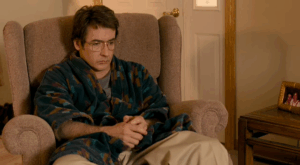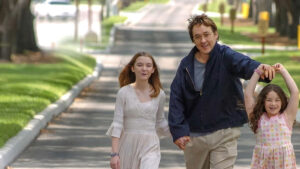Grace is Gone (2007) review
Dir. James C. Strouse
By: Steve Pulaski
Rating: ★★★½
There have been an unsurprising influx in war films since America initiated the wars in Iraq and Afghanistan, respectively, but there has also been an overabundance of films that show dad on the frontlines of battle rather than mom on the frontlines. Convention and long-standing images and repeating commercials have directed our minds to think of hundreds of young men when the word “soldiers” comes up in conversation, but women are rapidly making up more and more of our military as days go by. At this point, we’ve seen many films that show what happens when dad is absent and fighting for his country, but what about what happens when a father is left to take care of his two young daughters while his wife is overseas in Iraq, to find out she has been killed when he gets the tragic and heart-wrenching knock at his door? Grace is Gone attempts to depict such an incident.
The film stars John Cusack in a strong performance as Stanley Phillips, who works at a hardware store called Home Care and mans the fort at home with his daughters – twelve-year-old Heidi (Shélan O’Keefe) and eight-year-old Dawn (Gracie Bednarczyk). While Stanley – a Veteran himself – admires his wife’s audacity and commitment to the military, he wishes she was at home helping the girls through some of the most significant moments in their life (especially Heidi, who often appears to be twelve-going-on-eighteen). When the girls are at school, Stanley is informed that his wife was killed in battle. Rather than sob or break down in theatrics, he calmly sits down and stews in absolute silence, not calling into work, not calling the school his girls attend to inform them, or anything. He stews for several hours, quietly flinching when an unanswered phone call clicks over to the receiver and he hears his wife’s canned message.

When the girls are home, Stanley has some surprising news for them, although it’s not the news we expect him to reveal. He takes the two girls on a car trip to “anywhere they want.” The girls are puzzled by their once strict, schedule-reliant father cutting loose, especially in the middle of a school/workweek. Dawn says she wants to go to “Enchanted Gardens,” to which Stanley accepts without hesitation. The three are now bound for Enchanted Gardens, despite foggy air between them that only Stanley can see. Long takes on Stanley’s face show a deeply worried soul who will sooner-or-later have to break the news to his daughters that their mother has died, but right now, he realizes that if he himself can not comprehend what has just happen, how will he bring his daughters to do the same?
Along the way, Stanley makes a pit stop at his mother’s house, where his brother John (Alessandro Nivola) resides, unemployed and cynical. Stanley and John never quite got a long, with John often opposing many things and bearing a very pessimistic attitude towards life. A touching scene, however, comes when John takes Stanley’s daughters out for lunch and discusses their father’s service and tries to put in easily-understandable terms why the two don’t necessarily get along so well. Before the girls know it, it’s time to hit the road and they don’t even get to see their grandmother come home from work. Stanley has had enough of a nap and it’s time to get back on the road.

Grace is Gone isn’t the emotionally manipulative family drama about death and loss that we can easily assume it is. It’s a deep and intimate film about grief and denial that we all know has to veer into acceptance sooner or later. Cusack embodies this idea perfectly in the complex role of Stanley Phillips, only assisted by the work of O’Keefe and Bednarczyk, whose character must remain loyal to their clearly troubled and often incoherent father as he grapples with something he fears they simply won’t be able to understand.
An attribute that makes Grace is Gone lack the sentimentality it could’ve easily exploited is Clint Eastwood’s humble, low-key score, which comes in at the right moments and lingers in a way that isn’t intrusive or an overstayed welcome. Throw in a pleasantly manageable eighty-five minute runtime, softly-lit cinematography by Jean-Louis Bompoint, and writing and directing by James C. Strouse that doesn’t cater to a mainstream formula, and you have a film that should have a lot more recognition than it does in the face of emotionally manipulative dramas and subpar films concerning war.
Starring: John Cusack, Shélan O’Keefe, Gracie Bednarczyk, and Alessandro Nivola. Directed by: James C. Strouse.
About Steve Pulaski
Steve Pulaski has been reviewing movies since 2009 for a barrage of different outlets. He graduated North Central College in 2018 and currently works as an on-air radio personality. He also hosts a weekly movie podcast called "Sleepless with Steve," dedicated to film and the film industry, on his YouTube channel. In addition to writing, he's a die-hard Chicago Bears fan and has two cats, appropriately named Siskel and Ebert!


